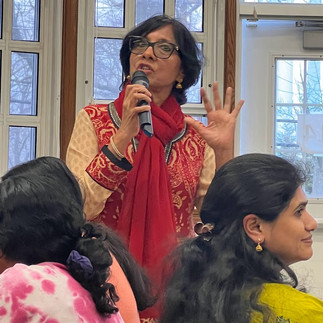Art of Storytelling ~ Climate Fiction Game
- Rina Visvanathan
- Jul 17, 2023
- 6 min read
Updated: Jul 23, 2023
What a Blast! Our Annual Gita Vicara - 2023
'The Art of Storytelling~Climate Fiction' Game
'Pass the Plot', 'Improv Under Pressure', 'Fable Friends'
We gathered to create fictional Stories using our wisdom game decks to highlight the impact of Climate Change. It was a game filled with creativity, laughter, camaraderie and competition! The impact was huge as each one of us had to develop some immediate insight composing a small segment of a story. Any genre was welcome - Mystery, Sci-Fi, Travelogues, Action & Adventure, Comedy. The story had to make sense going around a table of participants. The Reflective card decks covered Itihasas, Bhagavad Gita, Puranas and Contemporary Climate goals and obstacles from Project Drawdown. We all came away thinking we can make a difference by first listening to the climate fiction stories created by us. The Stories made us laugh, cry and think on topics that do seem overwhelming. But our own powerful stories will have a deep impact as we see the role we can play in our day to day lives to make a difference.
How the Storytelling Game is Played
A storytelling team consists of 6-8 participants and are faced with a few decks of cards. They provide the source material for creating a story. A very basic game could involve one card per deck for each participant. The team is given a story prompt and it is ‘Go’ time. Each person adds 1-2 lines to the story and everyone gets a turn. The team could vote on the best story line or continue to round 2. Multiple teams could have a face off with presentations of their story with the same prompt. Judges could rule on winners. Additionally, some games have game ‘twists’ that can be implemented to create new versions of game play. The participants could also create their own twist.
Why Build A Story?
The process of creating an original story requires much reflection, thought and creativity. Players as individuals are able to think deeply about their own experiences and relate them to a larger prominent issue. Because climate change is so prevalent in society, players are able to relate these issues to their everyday life and discover new ways in which they can make small differences. Furthermore, the addition of different goals, obstacles and components that players must add into their story, remind us of the sheer complexity of climate change, and that the solutions will be just as complex.
These games, cards, and ideas are timeless. They allow people of all ages to not only connect to their Indian culture, but to become aware of ecological issues in different ways. This is not restrained by any external factors as people who play these games can adapt the game play to any situation. It invokes deep thinking about the world but also fosters a sense of playfulness and enjoyment to playing the game. Big ideas and creative solutions are born through these games and allowing players to cooperate with each other in this setting is amazing. The youth and adults are the problem solvers of the future and starting them young, exposing them to these big ideas, will undoubtedly prepare them to experience real world issues of tomorrow.
Why Climate Fiction?
Many of these games are targeted towards youth and younger children, and adults are just as easily engaged. When climate related scenarios are exaggerated, or fictionalized it becomes easier to relate to and interact with the story. By playing with the imagination and fostering creative thinking, we can dwell on the issues of climate change while still enjoying the game interactions. It is a great way to ease the jarring concept of climate change to audiences of all ages.
The Games Played
'Pass the Plot', 'Improv Under Pressure', 'Fable Friends'
Click here for the Rules for each of the games. And rules can be changed by the participants with a group vote!
Constraints and Boundaries
Each game utilizes a different set of cards. These different setups create a different atmosphere and method of storytelling. While the storytelling games hold a similar foundation, each game holds its unique set of boundaries and constraints and forces players to think differently and collaborate in different ways among other players.
The Art of an Open Ended Prompt
The significance of an open ended prompt is the endless possibilities that come along with them. When players respond to the prompt at hand, there is a sense of focus to the story, an end goal. However, the story should be able to take on a life of its own so that it is unique each time the game is played. The games, while they instill important values, are enjoyed by all. They are entertaining, invoke creativity and allow a group of people to have fun.
Developing a Deck of Prompts
When developing the prompts, significant thought was placed on both creativity and realism. The prompts are related to ecology or climate but must also invoke a new thought and creative storytelling. Emphasis was placed on both aspects and a set of original prompts was developed to allow players of all ages to interact with ecology in a different way. This innovative way of storytelling allows for a unique reflection on one’s personal experiences and a new perspective to be placed on climate change. These prompts are a gateway to new discoveries, problem solving and fun game play that teaches us many values and lessons.
Ecological Concepts used in the Storytelling Games
The 10 R’s : Reduce, Reuse, Recycle, Renew, Rejoice, Rethink, Repair, Recirculate, Refuse, Regenerate. These concepts are utilized closely with the storytelling games. They serve as critical actions that can stimulate thought about potential solutions to ecological issues. When used in game, these cards are typically a catalyst for players to relate their solution to the issue in a more practical manner. By placing one of the 10 R’s in their solution, the story becomes less hypothetical and more realistic as players see their plan take shape.
5 Elements : Earth, Water, Air, Fire, Space. These are the different components of Mother Earth. This is what as a society we aim to protect and thus what the games are related to. These 5 elements are a significant aspect of the storytelling games and lay the foundation for the lessons, values, and goals that are presented.

Concept of 'Wisdom Decks' to inspire creative thinking
Games for Seva decks/games cover a broad spectrum of wisdom teachings from the Vedas, Upanishads, Puranas, Bhagavad Gita, Mahabharata, Ramayana, and many contemporary saints & thought leaders. In addition, Ecological decks have been created to bring in thinking on Climate Change, Biodiversity, Personal Responsibility, and our roles in shaping a future that lives in harmony with Nature.
These decks can be used in multiple settings to inspire creative thinking and problem solving. The guiding principle is that the more we use different insights from multiple perspectives, the more likely we are to develop an abiding, thoughtful vision towards constructing a life of purpose.
Card Decks Used in the Games - Click link for more details
Vision of the Gita / The Yoga of Divine Glories: These cards contain verses of the Bhagavad Gita and create a vast canvas of a vision that encompasses all of creation.
10 R’s Ecological Thinking Deck: Reduce, Reuse, Recycle, Renew, Rejoice, Rethink, Repair, Recirculate, Refuse, Regenerate. These words have a strong relation to the actions we take towards our environment. These cards thus allow players to thoughtfully discover how they can personally have an impact on ecological issues in various ways.
Make-a-Story Deck: These cards contain symbols of Indian heritage and become an important method to relate the storytelling in these games to rich culture.
Puranic Principles Deck: Cards include words of wisdom from the Puranas that can provide insight into solutions for a myriad problems or situations.
Personal Pledges on Plastic Usage Deck: The cards make pledge statements that can be included in any story scenario. These specific pledges add a grounding reality to the Climate Fiction storybuilding game.
Saving Amravati Wisdom Warrior Cards: This deck gives a vast array of role playing opportunities in dharma discussions & skits. Each Wisdom Warrior is a doorway to a heritage of epics & stories.
Obstacle and Goal Cards: Falling into the categories of community, planet or individual, the card presents an obstacle or goal that impacts climate change. They have been culled from the Project Drawdown list of solutions.
Memory Maya Game Cards: This game has focused on contemporary art representations for values from the Bhagavad Gita, with a deep reverence for the traditional words.
Vedic Principles Cards: Each concept is a fundamental precept in our understanding of the Vedic tradition. These have been culled from the Vedas, Upanishads, Ithihasas and Puranas.
Story Prompt Deck: This deck contains the main prompt for each round of the game and ranges in storytelling genre.
Making Your Case
This is especially important in the team competition setting. During this variation, each team has an opportunity to present their story to the judge. It is vital to the success of the team for the presentation to clearly explain the plot of the story, the goals and obstacles that were faced in a concise manner. Judges will also have access to a rubric which is used to judge the stories, so each team must ensure they include each component to win.
Gita Vicara Leadership Program Team
Aaria Mody
Aarthi Palaniappan
Aarya Patel
Aaryan Rupesh
Adhvaith Sreenivas
Adi Patnam
Adya Misra
Ankur Raghavan
Anoushka Rishi
Ashka Shah
Bhuvi Kumar
Devan Shah
Dylan Benedictus
Jash Mody
Jay Shah
Krishiv Shah
Mahir Patel
Manu Agarwal
Navya agrawal
Nikita Kumar
Nishanth Naveen
Nitin Rajagopalan
Parv Shah
Pranav Mohankumar
Raghav Bansal
Rina Visvanathan
Riya Saha
Riya Singh
Rohith Naveen
Sameer Mohan
Samy Arun Kumar
Sanjana Iyer
Sanskriti Rathore
Seva Kantu
Shah Jay jr
Shreya Kedia
Shreya Vasudevan
Tanishka Dhariwal
Tara Visvanathan
Varun Thopcherneni
Vedant Balani
Yana Dhingra

















































Comments